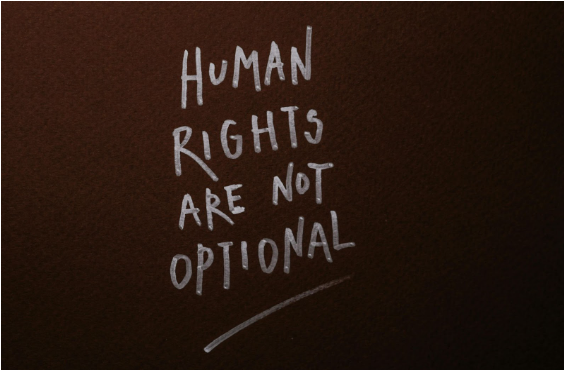By Annalyn Both

Over the last several years, human rights have been at the heart of much of the widely known international news. The #BoycottMulan campaign, which began in 2019, was a response to a comment by the film’s star supporting Hong Kong police in their crackdown on political demonstrations. The film also drew negative media attention for its use of the Xinjiang region, where China is known to abridge the human rights of Uighurs. In 2022, international outcry arose when Iranian Mahsa Amini died as a result of brutality from the morality police who punished her for not wearing her hijab properly. Today, issues concerning the Israel-Palestine conflict are often couched in terms of human rights. American activism on issues like these demonstrate that they care about universal human rights. However, while they protest abuses, they are simultaneously undergoing a moral revolution that undermines support for the very existence of universal human rights.
A key component of this revolution is the rise of moral relativism. This ideology has staked a claim on a large portion of our population and is manifested in common positions on cultural hot topics. For example, “My body, my choice” can be justified two ways. One way is to suggest the primary moral issue concerns controlling women. The other signifies advocates believe morality is relative to the individual, or at least no one has a superior claim to have figured morals out, and so they should not force their moral interpretation on others. Either way, these interpretations of the refrain are directly or effectively examples of moral relativism because they indicate that it is fine to have different opinions on moral issues, but you cannot enforce yours on others.
While the abortion example is just one particular interpretation of a particular issue, there is evidence that such moral relativism is fairly prevalent in the United States. Philosophy professor Thomas Polzler teamed up with psychologist Jennifer Wright to study this very topic. In a 2019 study of about 100 students and workers, they found that moral realism, which is the belief that morals are an objective and universal reality, was less common than anti-realism, which encompasses both the belief that morals do not exist at all and the belief that they are subjectively determined. More specifically, Polzler and Wright found that 64% of respondents believed moral truth was either determined by their own or their culture’s dominant moral beliefs. A much larger study of about 1,000 interviews in 2015 confirms Polzler and Wright’s conclusion. Barna Group, a private, non-partisan organization, found that 57% of American adults agreed that knowing what is right or wrong is a matter of personal experience. 65% of respondents agreed strongly or somewhat with the view that “every culture must determine what is acceptable morality for its people” while only about a third of respondents believed moral truth is absolute.
This moral revolution has significant implications for American support of human rights. The concept of universal human rights presumes at least a basic level of universal and objective morality. Universal human rights suggests that there are certain behaviors that no one, no matter their culture or beliefs or background, can engage in without actually wronging someone else. However, the erosion in belief in objective morality in the US has triggered a need to reconsider whether our culture’s philosophy justifies support for universal human rights at all. If one group of people can justly proclaim another person or group immoral, then the morality of the criticized behavior must supersede culture. If we are right to proclaim China to be immoral for sending Uighurs to concentration camps or Israel for failing to protect Palestinian civilians or Hamas for waging war using civilian human shields, then there must be at least some basic moral code that exists above the individual or cultural level. However, if we adhere to the ideologies that the research suggests are taking hold of Americans, then we have no basis for declaring another individual or culture in the wrong for behaviors it engages in outside our borders. For if each culture decides its own morality, then it can decide it is not immoral to elevate one people group within the culture and oppress another. If morality depends on the individual, then we do not even have grounds to judge others in our own culture, let alone in another. If either of these ideologies are true, our condemnation of a foreign culture or state has no place pressuring them to change because we have no right to tell anyone else what they should and should not do. Our condemnations would be nothing more than commentaries on cultural differences or expressions of personal preferences.
While this shift to moral relativism has not stopped many from speaking out against human rights violations yet, belief in our domestic lives that morality is individually subjective, or at least culturally determined, philosophically undermines our condemnation of international abuses and cripples our ability to address them. If people truly believe that they are right in their condemnations, they must believe in at least some universal morality. If we want to be credible actors on the issue of human rights, we must have a standard by which to identify them. Without universal morality providing consistent guiding moral principles, even if we agree to support human rights because doing so feels right, disagreement over what counts as a right or as an infringement will increase. We will face increasing challenges in our engagement with this field because each protester and decision maker will be guided by his or her own preferences and intuitions rather than by a shared objective standard to work towards.
Americans have a decision before us. We can continue along the path of this moral revolution, upholding relativist views in our personal lives at the cost of having a justification for condemning atrocities beyond ourselves or our society, or we can return to moral objectivism as the first step to upholding human dignity through the support and defense of human rights. This return will not resolve all of the troubles and challenges we face in upholding human rights. However, without even admitting to the existence of universal morality, we remove the very possibility of there being a reliable guide for identifying human rights or a reason to engage in such issues beyond the manifestation of our own preferences. We must reverse course before the moral revolution taking hold in the United States finishes its exchange of justification for universal human rights with the affirmation of individual and cultural relativism.
Photo Credit: https://www.pexels.com/photo/handwritten-message-on-brown-background-6185320/.

